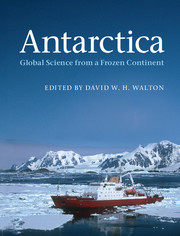Book contents
- Frontmatter
- Contents
- List of contributors
- Introduction
- 1 Discovering the unknown continent
- 2 A keystone in a changing world
- 3 Ice with everything
- 4 Climate of extremes
- 5 Stormy and icy seas
- 6 Life in a cold environment
- 7 Space science research from Antarctica
- 8 Living and working in the cold
- 9 Scientists together in the cold
- 10 Managing the frozen commons
- 11 Antarctica: a global change perspective
- Appendix A Visiting Antarctica
- Appendix B Further reading
- Acknowledgements
- Index
Introduction
Published online by Cambridge University Press: 05 March 2013
- Frontmatter
- Contents
- List of contributors
- Introduction
- 1 Discovering the unknown continent
- 2 A keystone in a changing world
- 3 Ice with everything
- 4 Climate of extremes
- 5 Stormy and icy seas
- 6 Life in a cold environment
- 7 Space science research from Antarctica
- 8 Living and working in the cold
- 9 Scientists together in the cold
- 10 Managing the frozen commons
- 11 Antarctica: a global change perspective
- Appendix A Visiting Antarctica
- Appendix B Further reading
- Acknowledgements
- Index
Summary
The polar regions have long exerted a fascination for politicians, scientists and the public in many countries. The early concerns were a mixture of scientific investigations (especially for magnetism) and the drive to explore and annex unknown lands, a feature of imperial powers of the nineteenth and twentieth centuries. Thus, the United Kingdom, along with Germany, France and Sweden, all made important contributions in the early twentieth century to those pioneering explorers from Britain, Imperial Russia, France and the United States who all claim a part in the original discovery of the continent in the eighteenth and early nineteenth centuries.
Despite the heroic national expeditions led by Scott, Shackleton, Amundsen, Bruce, Mawson, Drygalski, Filchner, Nordenskjöld and Charcot early last century, the Antarctic was seen as a backwater by most scientists, ignored as having little of significance to contribute to major scientific paradigms, whilst its remoteness and climate provided almost insurmountable obstacles to access and work there.
How dramatically this has changed is now familiar to many people throughout the world as during the last 60 years the continent has been the subject of increasing international research of the most sophisticated sort. With the initial stimulus of the International Geophysical Year to highlight the Antarctic as one of the two great ‘Unknowns’ (the other being space), those countries with scientists active there have grown from 12 to over 30, a remarkable international legal instrument has developed to manage not only the continent but the surrounding Southern Ocean, and the science has gone from initial survey and list making to addressing global problems such as the impacts of climate change on world sea level, marine biodiversity and its origins, the history of world climate over the past 1 million years, the relationships between the Sun and the physics of the Earth’s atmosphere, and the origins of the southern hemisphere continents. Antarctic science is no longer a backwater but a major contributor to our understanding of the way in which the world works – the holistic study we now call Earth System Science – and discoveries there make major news stories throughout the world and documentaries on television.
- Type
- Chapter
- Information
- AntarcticaGlobal Science from a Frozen Continent, pp. xi - xiiPublisher: Cambridge University PressPrint publication year: 2013



